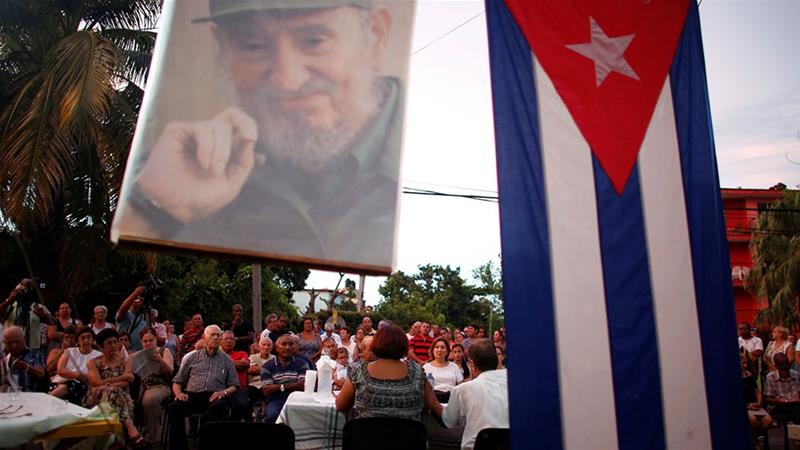Cuba’s new constitution is the same as the old one — undemocratic

Maybe you heard: Communist Cuba is on the road to freedom.
That’s what Cuba’s rulers want you to think after the Cuban people overwhelmingly approved a new constitution on Sunday. But the opposite is true. Cuba’s rulers have only cemented their control, and the Cuban people are no closer to freedom today.
Just look at the process that created this new constitution, which was anything but democratic. It began last summer when the National Assembly established a commission to draft the text. The Assembly claims to represent the Cuban people, but its most recent election fielded a party-approved candidate in each of its 612 races. The electorate could only vote yes or no. Every Communist candidate won.
As for the commission, it consisted of 33 hardline Communist loyalists, chaired by none other than First Secretary of the Communist Party of Cuba Raul Castro. Its only goal was to safeguard the tyrannical one-party state, which it accomplished by drafting a charter that makes socialism in Cuba “irrevocable.”
Ultimately, the new constitution is little more than a public-relations stunt. Like the Soviet constitution of old, it has freedom-friendly language on paper that disappears in reality.
For example, the document ostensibly recognizes private property for the first time. This is a meaningless clause considering the constitution also reiterates the “irrevocable” role of central planning and state control over production and land use. Nor can there be any meaningful protection of private property in a country that refuses to recognize the concept of individual rights.
Cuba’s fake rights
Similarly, the text appears to restore the presumption of innocence in Cuban courts and the right to legal representation. This, too, is a dead letter. All lawyers and judges serve at the pleasure of the Communist Party and follow its dictates. The regime also routinely ignores those due process obligations that already exist in Cuban law, including the right to petition the authorities with grievances, and has arrested and imprisoned thousands of political prisoners without formal charges in recent years.
Finally, the constitution seems to place constraints on Cuba’s president, restricting the position to two consecutive terms and creating a new and co-equal office of prime minister. But the true ruler of the country — as in all Marxist systems from China to North Korea — is the party’s first secretary. In Cuba, it’s Raul Castro. There are still no checks and balances on this all-powerful position; the Castro family continues to control every facet of Cuban life.
These and other so-called reforms are little more than a colorful new paint job on the same rusty old Communist architecture. The structure underneath is still a totalitarian state that bans political parties, imprisons and harasses dissenters, and denies the Cuban people’s most basic human rights.
Nothing will change
Tellingly, the constitution omitted any reference to the freedom of conscience. The regime actively tried to prevent Christians from speaking out or even participating in the referendum.
Then again, the referendum itself was a ploy by Havana to legitimize its rule and disarm foreign critics. It left pro-freedom Cubans in a lose-lose situation. They could either vote no in an election with a pre-ordained outcome or refuse to participate altogether, giving the regime a lopsided victory either way. The U.S. media is lauding the 9% who voted no — a historic high — but that number is highly suspect for a dictatorship that craved a democratic veneer. Havana could very well have pulled it out of a hat.
Meanwhile, for the Cuban people, nothing will change.
The regime will laud this new step in the revolution’s struggle, even as its subjects struggle to survive in a nation defined by poverty. Last week, I spoke with Rosa María Payá, a Cuban activist whose father Oswaldo Payá founded a movement opposed to the Communist Party. The regime assassinated him in 2012, and now his daughter tells me the new constitution only “guarantees the perpetuation of the dictatorship.”
Rosa María believes the Cuban people deserve a real referendum, which she advocates through an initiative known as Cuba Decide. Tens of thousands of her fellow citizens have joined her to call on Havana to hold a yes-or-no vote — not on a Communist constitution, but on the Communist Party itself.
The regime will never let such a vote happen because it fears nothing more than the Cuban people. Instead, it staged a rigged referendum to fool the world and fortify its rule. The new constitution is a charter of renewed tyranny, not liberty, and so long as the Communist Party reigns in Havana, Cuba will never be free.
Marion Smith is executive director of the Victims of Communism Memorial Foundation.

